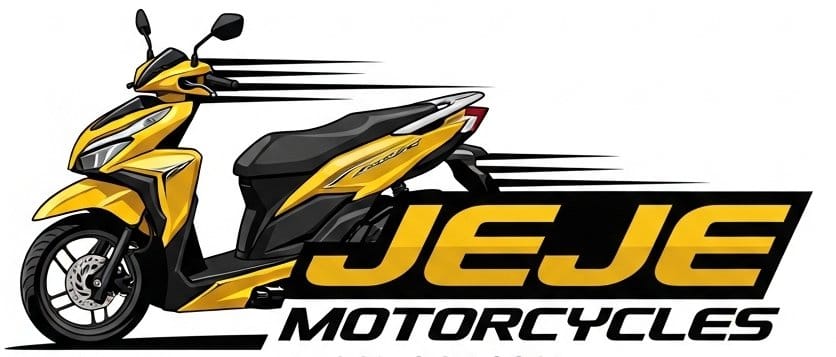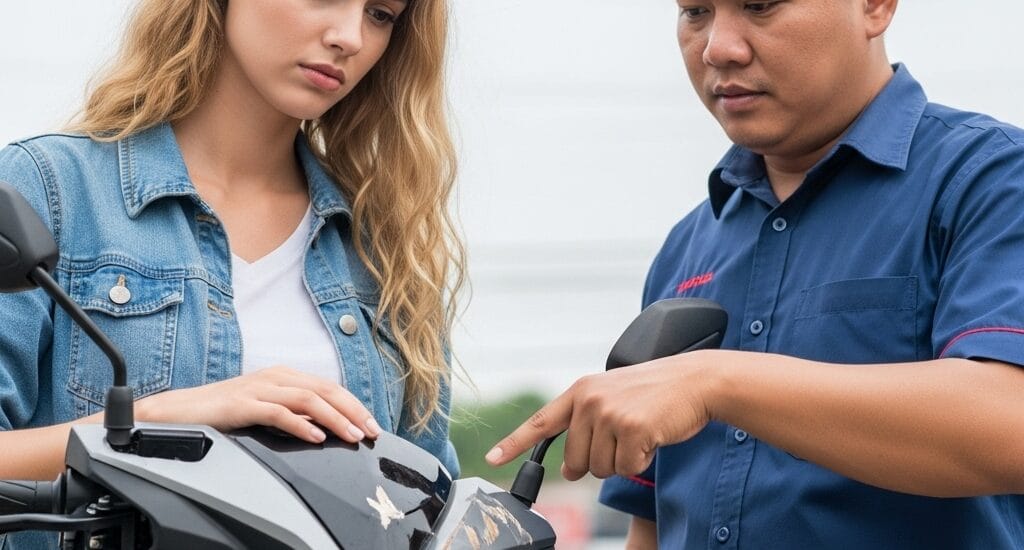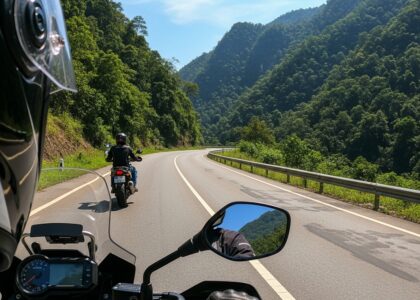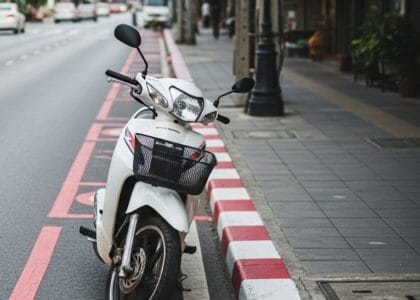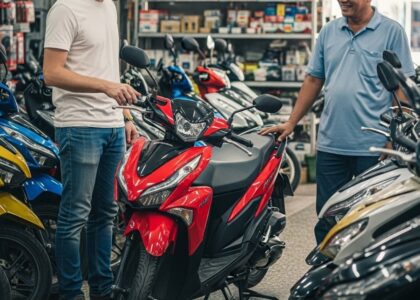Renting a scooter in Thailand is one of the best ways to get around. It’s cheap, convenient, and gives you the freedom to explore places that taxis and buses don’t always reach. From quiet beaches to scenic mountain roads, there’s nothing quite like riding on two wheels through Thailand.
But not every rental experience is a good one. In some tourist-heavy areas, there are scams that catch travelers off guard. This guide will help you spot the common tricks and avoid problems before they start.
1. The “You Damaged It” Scam
This is one of the most reported scams. You return the bike thinking everything went smoothly, but then the shop points to a scratch or a cracked panel. They insist you caused the damage and ask you to pay a high repair fee. The truth is, the damage may have already been there when you picked it up.

How to protect yourself:
- Take good quality photos and a short video of the motorbike from all angles before leaving the shop. Make sure to capture the wheels, mirrors, front panels, sides, guards, and under the seat. One of these pictures should have the shop partially in view. Never trust the rental stores inspection photos or report.
- Do the inspection with the staff and make sure they see you recording everything.
- Choose shops that seem professional and provide a proper agreement with all terms clearly stated, not just one who throws you the keys!
2. Holding Your Passport
Some rental shops will ask to keep your passport during the rental. This gives them power over you if there’s a dispute. In some cases, they may use it to pressure you into paying for fake damage or additional fees.
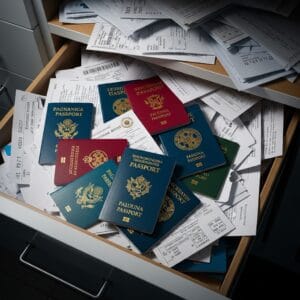
What to do instead:
- Offer a cash deposit and a copy of your passport instead. Many honest shops are happy with this.
- If a shop insists on holding your original passport and will not accept anything else, it’s better to walk away and find another place.
- If you are caught up with a rental shop that will not return a passport, contact the Thai Tourist Police on 1155 or the equivalent if in another country.
3. Fake Fines or “Helpful Locals”
In a few cases, tourists have reported being stopped by people pretending to be police officers or locals who suddenly show concern for your rental. They may say you broke a rule or that your bike was reported stolen, and then ask for a cash payment to solve the problem. While rare in Chiang Mai, it’s not uncommon for these scammers to even wear a police-style vest or a uniform-like shirt, making them seem more convincing.

How to stay safe:
- Always ask for official documentation and identification if someone claims to be a police officer. True Thai police officers will have clear ID badges, full uniform, be riding a clearly marked police motorcycle and often carry a radio and a firearm, giving them a more professional appearance.
- Legitimate fines are almost always issued with an official ticket. This ticket will specify the offense, the fine amount, and give you options for payment, usually at a police station, a bank (like Krungthai Bank), 7-Eleven, or even online.
- Do not hand over money directly on the spot unless you are issued an official, printed ticket. While some minor infractions might be settled with an on-the-spot payment at a legitimate checkpoint to save a trip to the station (often for small, common offenses like not wearing a helmet), this is a grey area and can sometimes blur into what locals refer to as “tea money” or a bribe. For any significant or unusual accusation, insist on an official ticket.
- Be wary of direct cash demands without a ticket. If someone demands cash immediately for an alleged severe offense or claims your bike is “stolen” without concrete evidence or official procedure, this is a major red flag for a scam. You should never pay cash directly to an individual without a formal process.
- If something feels off, contact us or your rental company before agreeing to anything. They may be able to verify the situation or advise you further.
4. Mysterious Towing or Theft
Some travelers return from the beach or a café to find their bike gone, or worse, clamped. A company might claim it was parked illegally or not locked, then charge a fine or offer to “help” recover the bike for a fee. This often involves either a scamming “towing service,” an unofficial clamping operation, or even the rental company itself claiming the bike was improperly parked or stolen.
How to prevent this:
- Always lock your bike securely, even if you are stepping away for a minute. Use both the steering lock and any additional disc locks or chain locks provided by the rental company.
- Avoid parking in areas with no clear signs or in front of private properties. Always look for designated motorbike parking areas. If unsure, ask a local shop owner or a trustworthy local where it’s safe to park.
- Take a quick photo of your parked bike, noting its exact location and any nearby landmarks. This can serve as proof of where and how you left it.
- Ensure you are not parking in a clearly marked “no parking” zone. These zones are often indicated by red and white or black and white striped curbs, or specific “no parking” signs (sometimes in Thai with an international “no” symbol).
- If your bike is clamped or chained: Do not attempt to remove the clamp yourself, as this can lead to further severe legal trouble. Legitimate clamping operations will usually leave a clear notice with instructions on how to pay the fine and have the clamp removed. If no notice is present, or if it feels suspicious, immediately contact us or your rental company for advice before doing anything else. They might have experience with local towing/clamping services.
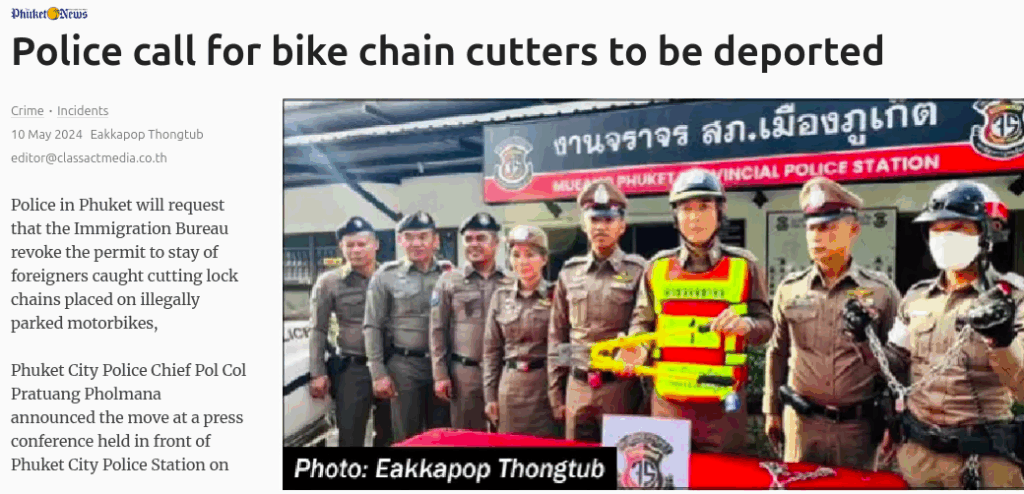
5. Overpriced Repairs
Another trick involves inflated repair costs. Some shops take advantage of small scratches or wear and tear and send the bike to a friendly repair shop that charges far more than the damage is worth. This is sometimes also seen with more slightly serious damage such as badly scratched up panel which could be replaced for under USD $100 but charged at almost the value of the bike.
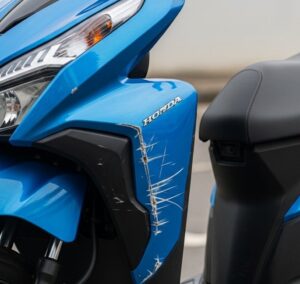
To avoid being overcharged:
- Ask the shop if they have a list of standard repair fees for common issues.
- Be wary of vague or verbal-only agreements. Insist on a written receipt.
- If the price seems excessive, take the bike to another rental shop or mechanic and ask them if the quote is fair.
- Consider checking Google Maps reviews or asking other travelers about the shop’s reputation before renting.
Helpful Tips Before You Ride
- Choose a rental shop with clear prices, paperwork, and good online reviews.
- Test the brakes, lights, horn, and indicators before you leave.
- Keep a copy of your rental agreement and contact number in your bag.
- Use your phone to record where you park, especially in busy areas.
- If you are ever unsure or feel pressured, trust your gut and go elsewhere.
Renting a motorbike in Thailand can give you a real sense of freedom and fun. The vast majority of operators and rentals go smoothly, especially when you deal with honest businesses. But a few precautions at the start can save you time, money, and stress later on.
We wish you a safe time
